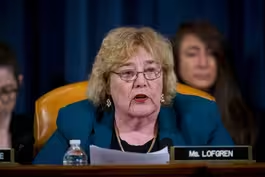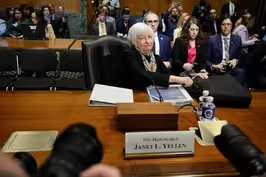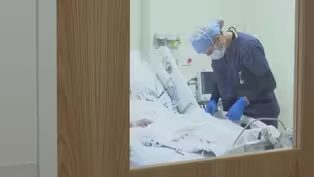
Mudlarkers uncover archaeological treasures along rivers
Clip: 3/16/2023 | 5m 50sVideo has Closed Captions
Mudlarkers uncover archaeological treasures along London's river banks
The phrase "One person's trash is another's treasure," certainly applies to author Lara Maiklem. She is what's known as a "mudlarker" and spends her spare time scouring the shores of London’s River Thames for artifacts. Maiklem wrote a best-selling book explaining her passion for this unusual pastime. Special correspondent Malcolm Brabant joined her down in the mud.
Problems playing video? | Closed Captioning Feedback
Problems playing video? | Closed Captioning Feedback
Major corporate funding for the PBS News Hour is provided by BDO, BNSF, Consumer Cellular, American Cruise Lines, and Raymond James. Funding for the PBS NewsHour Weekend is provided by...

Mudlarkers uncover archaeological treasures along rivers
Clip: 3/16/2023 | 5m 50sVideo has Closed Captions
The phrase "One person's trash is another's treasure," certainly applies to author Lara Maiklem. She is what's known as a "mudlarker" and spends her spare time scouring the shores of London’s River Thames for artifacts. Maiklem wrote a best-selling book explaining her passion for this unusual pastime. Special correspondent Malcolm Brabant joined her down in the mud.
Problems playing video? | Closed Captioning Feedback
How to Watch PBS News Hour
PBS News Hour is available to stream on pbs.org and the free PBS App, available on iPhone, Apple TV, Android TV, Android smartphones, Amazon Fire TV, Amazon Fire Tablet, Roku, Samsung Smart TV, and Vizio.
Providing Support for PBS.org
Learn Moreabout PBS online sponsorshipAMNA NAWAZ: The phrase one person's trash is another's treasure certainly applies to author Lara Maiklem, who spends her spare time scouring the shores of London's River Thames.
She is what's known as a mudlarker and has written a book explaining her passion for this unusual pastime.
Just for a lark, our own British treasurer, special correspondent Malcolm Brabant, joined her down in the mud.
MALCOLM BRABANT: Low tide at Greenwich, one of London's most historic Thames-side districts.
For two hours, it's safe enough to explore this treacherous river's foreshore, the section revealed between tides.
Nature's scavengers get a taste of what's washed up.
Also drawn beneath the high watermark are treasure hunters with metal detectors, and someone else who relies on nothing else but the mark one eyeball.
LARA MAIKLEM, Author, "Mudlarking: Lost and Found on the River Thames": My name is Lara Maiklem.
And I'm a mudlark.
MALCOLM BRABANT: What's one of those?
LARA MAIKLEM: A mudlark is somebody who searches for history.
We're looking for the lost and found things that, in London, date back 2,000-years-plus.
MALCOLM BRABANT: To an untrained eye, the pebbles are unremarkable, but not to the mudlark.
LARA MAIKLEM: This is ordinary utility wear, and this is where the handle would have attached.
And this was probably maybe a big jug for pouring out ale, would have been used in the kitchens and in serving areas of the Tudor palace that was up there.
MALCOLM BRABANT: The palace no longer exists.
Standing in its stead is the National Maritime Museum.
This was the domain of England's King Henry VIII, who acquired six wives.
The 16th century was Greenwich Mean Time.
Beheading was more convenient than divorce.
The king also had a mean appetite.
LARA MAIKLEM: So, even bits like this, these are - - this would have been food.
This is domestic waste from -- again, from the palace up there.
So we have got a rib bone here.
This could have been part of one of Henry VIII's feasts.
You can imagine him sitting at the table with Anne Boleyn chomping away on this -- on this rib.
MALCOLM BRABANT: Pin-sharp vision is required to spot the most mundane items that the mudlark brings to life.
LARA MAIKLEM: Those are handmade pins.
These were for people to pin their clothes together, because buttons were expensive.
They didn't have zippers and poppers like we have today.
And that's how everyone was held together.
MALCOLM BRABANT: Do you think you're going to get rich doing this?
LARA MAIKLEM: Absolutely not.
I'm never going to get rich doing this.
I'm not looking for treasure.
I try and avoid the word treasure, because that makes people think that I'm hunting for gold.
And I'm not.
I'd actually rather find an old shoe, because it tells better stories.
So, one question people always ask me is, what's my favorite find?
And it has to be this.
It's a Tudor shoe.
It's a child's shoe.
So it's about 500 or 600 years old.
And when I pulled it out of the mud, it was in perfect condition.
I looked inside it, and I could see the impression of its original little owner's toes and heel in it.
We will never know who owned this little shoe, but it tells a story of ordinary people in London, a little boy or a little girl maybe running across the Murdoch.
They lost their shoe.
Perhaps they'd been bullied and somebody had pulled it off and thrown it into the river for a laugh.
Maybe it just wore out and they threw it away.
MALCOLM BRABANT: Besides disgorging broken relics of two millennia, the river also spits out a mass of 21st century trash.
But, on this day, the air was untainted by the stench of sewage polluting the river more frequently as London grows apace.
Mudlarking is very much affected by the rhythms of the river.
The tide has just turned and is coming in.
Every 12 hours, this takes place, bringing a new delivery of London's history.
And here is something that's 2,000 years old.
LARA MAIKLEM: These objects don't really come alive until you find out what they are.
And then -- and then they get this life to them.
And, this, it looks pretty boring, but it - - actually, it's a chunk of Roman floor.
And it's beautifully polished.
They would have polished it with beeswax.
And you can imagine the feet that pass over this that carried on polishing it to this lovely sort of smoothness.
One of the great things about the river is that it's anaerobic.
The mud is anaerobic, which means there's no oxygen gets into it, and it preserves organic material perfectly, almost as perfectly as the day it went in.
Now, this little comb is made of boxwood.
It's only half a comb.
It's broken in half.
One side would have been for getting out the parasites and the nits and the other side for styling hair.
MALCOLM BRABANT: Do you have a Holy Grail of something that you would like to find?
LARA MAIKLEM: Do you know what?
I did have a Holy Grail.
And it was actually a holy relic.
I really, really wanted to find a medieval pilgrim badge.
And I searched for 20 years for a complete medieval pilgrimage.
I have only found pieces of it.
And then, a couple of years ago, I finally found one.
This medieval pilgrim would have gone down to Salisbury Cathedral on pilgrimage, would have bought it down there, really just in the way that we buy maybe a fridge magnet or a key ring.
They were cheap, and they might have rubbed it against his shrine just to bring him a little bit of magic from the shrine.
MALCOLM BRABANT: Over the past 20 years, the river has been revitalized, especially by the clipper service.
But there's a price to pay.
LARA MAIKLEM: This is the remains of a medieval jetty, of a Tudor jetty that was associated with Henry VIII's palace, which was just up here known as the Palace of Placentia.
We're losing an awful lot on the river.
An awful lot of archaeology is going.
You will see when this boat comes past, actually, the amount of wake that comes in.
And that is what's eroding the foreshore and taking all of this archaeology away with it.
MALCOLM BRABANT: And the remains of the medieval jetty are swallowed by old father Thames.
But they will reappear 12 hours later, when the river provides the next opportunity to mudlark.
For the "PBS NewsHour," I'm Malcolm Brabant in Greenwich.
AMNA NAWAZ: Hidden history right under our feet.
CDC reports rise in maternal mortality, Black infant deaths
Video has Closed Captions
Clip: 3/16/2023 | 9m 51s | CDC data shows rise in maternal mortality and deaths of Black infants in U.S. (9m 51s)
Democratic Rep. on banking regulations, border security
Video has Closed Captions
Clip: 3/16/2023 | 5m 56s | Democratic Rep. Zoe Lofgren on banking regulations, border security (5m 56s)
Minn. governor says state is model for transgender rights
Video has Closed Captions
Clip: 3/16/2023 | 7m 12s | Minnesota governor says his state is national model for transgender rights (7m 12s)
News Wrap: Yellen dismisses fears more banks may collapse
Video has Closed Captions
Clip: 3/16/2023 | 6m 25s | News Wrap: Yellen dismisses fears more banks may collapse (6m 25s)
Pandemic burnout worsens nursing shortages in hospitals
Video has Closed Captions
Clip: 3/16/2023 | 7m 37s | Pandemic burnout worsens nursing shortages in hospitals across U.S. (7m 37s)
TikTok says Biden administration pressuring it to sell
Video has Closed Captions
Clip: 3/16/2023 | 9m 46s | TikTok says Biden administration pressuring it to sell company as security concerns grow (9m 46s)
Providing Support for PBS.org
Learn Moreabout PBS online sponsorship
- News and Public Affairs

FRONTLINE is investigative journalism that questions, explains and changes our world.

- News and Public Affairs

Amanpour and Company features conversations with leaders and decision makers.












Support for PBS provided by:
Major corporate funding for the PBS News Hour is provided by BDO, BNSF, Consumer Cellular, American Cruise Lines, and Raymond James. Funding for the PBS NewsHour Weekend is provided by...





